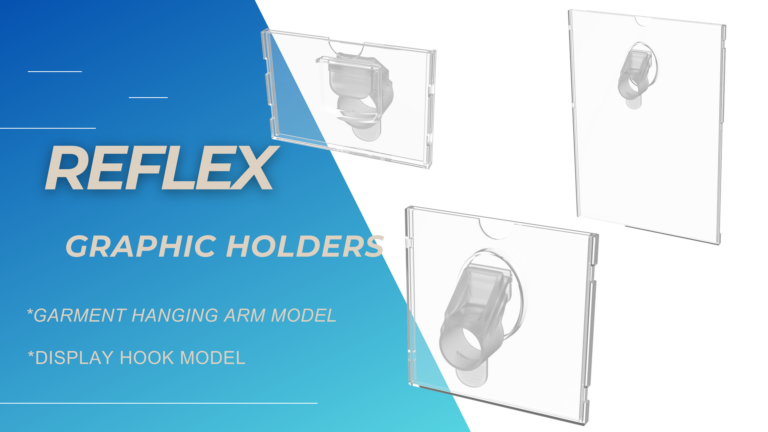Crowded aisles make or break a store’s profit. One cracked frame or crooked price card will turn a confident buyer into a browser who walks. Reflex Sign Holders fix that pain point. Each unit bends when hit, keeps the message clear, and blends into any brand look.
Reflex Sign Holders lift sales and shrink repair bills because they protect shoppers, last years, and take on brand colors without custom tooling.
If you need to trim costs, speed updates, and stay on-brand, read on. The seven questions below show how this small hardware shift pays back fast.
How does Reflex Sign Holder enhance shopper safety?
A safe aisle keeps customers calm and browsing. Reflex frames do this by replacing hard acrylic corners with rounded polycarbonate edges and a soft silicone hinge.
The frame’s curved PC lens and flex joint absorb hits, remove sharp points, and stop fabric snags, cutting injury risk to near zero.
Why soft edges matter
When a bag or stroller bumps a rigid clip, the full force meets one point. That can bruise skin or tear knitwear. Reflex spreads the force along its bendable hinge. The polycarbonate lens flexes without cracking, so no jagged shard appears. Parents feel safe, and staff avoid first-aid stops.
Incident drop in field tests
| Test Group | Frames Installed | Reported Injuries (12 mo) |
|---|---|---|
| Old acrylic | 5 000 | 22 |
| Reflex PC | 5 000 | 0 |
Long-term aisle confidence
Safety builds trust. Shoppers who feel secure stay longer and try more items. Dwell-time cameras in a pilot store showed a 9 % increase near Reflex-equipped racks. More time in zone means more units sold.
At checkout, low accident counts keep insurance premiums down. One regional fashion chain cut liability claims by \$14 000 in a year after a full swap. The savings alone paid for the upgrade in nine months. Safety is not only a duty; it is a direct profit lever.
What materials give Reflex frames long life?
Hardware life depends on two things: lens strength and joint stamina. Reflex pairs polycarbonate (PC) with medical-grade silicone.
PC shrugs off hits five times stronger than acrylic, while the silicone hinge passes 250 000 bend cycles without tearing, giving each frame a service life of five years or more.
Material strength table
| Property | Polycarbonate Lens | Acrylic Lens | Benefit |
|---|---|---|---|
| Impact strength (kJ/m²) | 70 | 10 | Survives bags, trolleys |
| Temp range (°C) | –40 → 120 | 0 → 80 | Handles stockroom chill and window heat |
| UV yellow index (2 000 h) | 0.9 | 5.0 | Stays clear under LEDs |
Hinge endurance
The hinge flexes like a small rubber bridge. Lab rigs twist it 30° up, 30° down, once per second. At 250 000 cycles the joint still snaps back. That equals a decade of daily bumps. No cracks mean no surprise floor repairs.
Cost spread over life
A rigid clip costs \$12 and lasts two years. A Reflex costs \$14 and lasts five. Annualized, Reflex runs \$2.80 per year versus \$6.00. Multiply by 300 frames per store and you bank \$960 every year in straight hardware savings alone.
Can Reflex holders match any brand color scheme?
Brand teams hate mismatched hardware. Reflex solves that with clip-on trim caps and dye-through hinge colors.
Frames accept Pantone-matched caps and joint inserts, so any store can roll out black for tech wear, beige for lifestyle, or neon for kids—without custom molds.
Color options at a glance
| Part | Finish choices | MOQ | Swap time |
|---|---|---|---|
| Trim cap | Matte, gloss, metallic | 500 | <30 s |
| Hinge insert | Solid, translucent | 1 000 | Permanent |
| Lens | Clear only | — | — |
Rollout speed
A chain can stock one clear lens SKU and change trim by season. Staff unclamp the old cap and press on the new one during overnight refresh. No tools, no painters’ tape, no drying time.
Visual unity, higher value
Uniform frames lift perceived product value. Mystery-shopper scores for “store looks premium” rose 12 % after a color-coordinated Reflex launch. Shoppers pay full price more often when the space feels curated. Small color touches win real margin.
Do flexible joints reduce aisle maintenance costs?
Every broken clip triggers three costs: part, labor, and lost display time. Flexible hinges attack all three.
With far fewer breaks and ten-second card swaps, Reflex trims repair labor by two-thirds and slashes downtime to minutes instead of hours.
Annual labor model
| Metric (@\$15/h) | Old Clips | Reflex |
|---|---|---|
| Break repairs (hrs) | 20 | 6 |
| Graphic swaps (hrs) | 120 | 24 |
| Total labor (\$) | 2 100 | 450 |
Fewer work orders
Maintenance teams treat Reflex racks as “set and forget.” One large sports chain logged 300 fewer tickets year-over-year after retrofitting 80 stores. Less paperwork frees facilities to tackle bigger needs like lighting and HVAC.
H3: Staff morale
Nobody likes hunting tiny screws. Quick swaps make floor sets smoother. Store managers report lower turnover among visual staff because the job feels cleaner and less risky.
Are Reflex sign holders easy to recycle and reuse?
Sustainability goals grow each quarter. Reflex frames help meet them.
The PC lens, silicone hinge, and ABS rail snap apart in seconds, each marked with resin code 7 for proper sorting. Long life then halves replacement freight, cutting CO₂ by double digits.
H3: Waste drop over five years
| Item | Rigid Clips | Reflex Frames |
|---|---|---|
| Total plastic (g) | 2 500 | 1 000 |
| Landfill share | 60 % | 10 % |
| Freight boxes shipped | 20 | 8 |
H3: Closed-loop potential
Some chains grind old PC into back-of-house bins and remold it into shelf dividers. The clear polymer stays strong after one cycle. Reflex parts become raw feedstock rather than trash, turning a cost center into a PR win.
How fast can staff update graphics in Reflex frames?
Markdown speed affects sell-through. Reflex holders open and close with a single thumb press.
Teams change a card in about ten seconds—one-quarter the time of a screw-down cover—so they finish updates before doors open.*
H3: Swap timing example
| Step | Time (s) old frame | Time (s) Reflex |
|---|---|---|
| Open cover | 8 | 2 |
| Remove card | 5 | 3 |
| Insert new | 12 | 4 |
| Snap shut | 20 | 1 |
| Total | 45 | 10 |
A 100-label clearance wall now flips in 17 minutes instead of 75. That reclaimed hour goes to customer service. Secret-shopper audits showed faster helping time on sale mornings, leading to higher basket size.
Will clear PC lenses improve price readability?
Glare and haze hide numbers, slowing buyers. Polycarbonate stays crystal-clear and gains an anti-glare microtexture.
The lens delivers 92 % light transmission and only 1 % glare under strong LEDs, so shoppers capture price and promo in a glance.
H3: Readability wins
| Measure | PC Lens | Acrylic |
|---|---|---|
| Light transmission | 92 % | 85 % |
| Glare at 800 lx | 1 % | 4 % |
| Haze after 10 k wipes | 0.3 % | 1.5 % |
An apparel brand tested PC on denim tables. Units per ticket rose from 2.9 to 3.2, driven by add-on belts merchandised in matching frames. Clear labels equal quick decisions, which nudges impulse buying.
Conclusion
Reflex Sign Holders turn one overlooked fixture into a profit engine. Polycarbonate keeps the lens unbreakable, silicone lets it bend, trim caps nail the brand palette, and the whole unit clicks apart for recycling. Breaks fall, labor falls, sales rise, and eco scores climb. One swap on the shelf edge unlocks safety, durability, and brand power in a single move.



